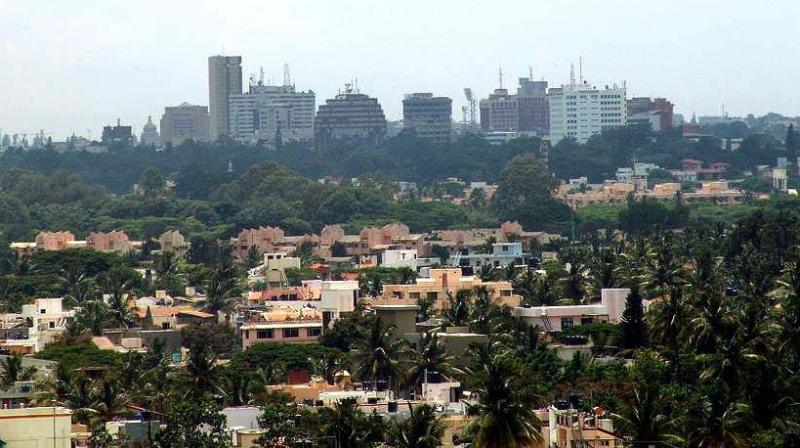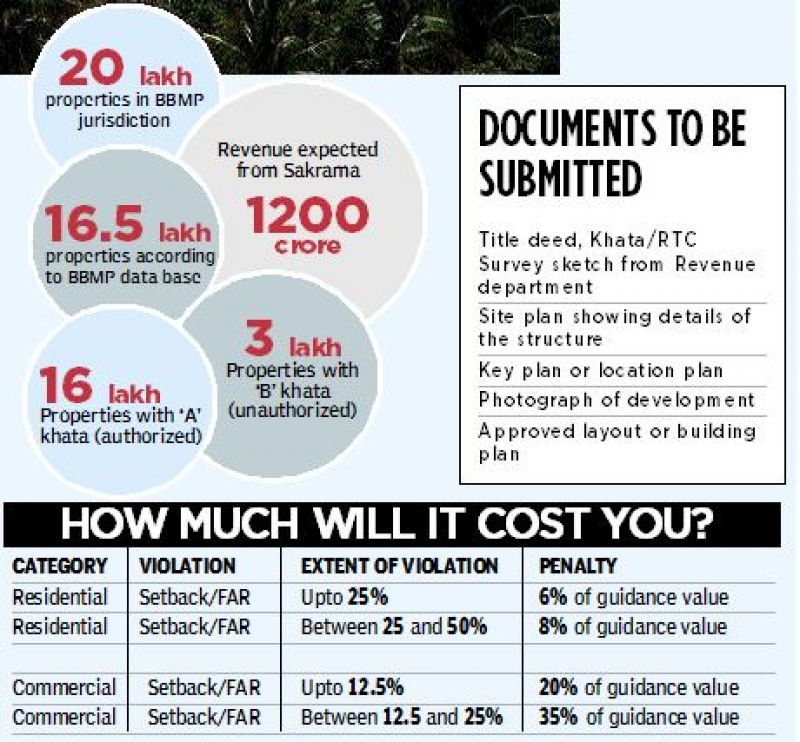Mr Babu, will all Akrama become Sakrama with this?
The BBMP will rake in revenue with the Akrama Sakrama scheme, making a mockery of the law.

Dishonesty pays! The BBMP will rake in revenue with the Akrama Sakrama scheme, making a mockery of the law as it helped create the very violations it is now attempting to reverse. Builders, the chief perpetrators of these crimes will emerge untouched; the engineers who took bribes in exchange for allowing violations are now in charge of regularising them. Why must our legal mechanism protect the corrupt.
Building owners with violations to their name have great cause for celebration as the High Court upheld the validity of the Akrama Sakrama scheme this week. Deviations of 50 and 25 percent for residential and commercial structures can be regularized by paying a fine. While this makes a lot of sense both for violators and the BBMP, it has invited the wrath of law-abiding citizens. The scheme also makes no provision for punishing the officials who allowed these violations to happen in the first place, letting them take place under the government’s nose.
Below are excerpts from leading urban experts:
What will happen to corrupt officials?
The High Court’s has upheld the Akrama Sakrama scheme, yes, but this means it’s time for the government to plan its implementation. City Councils have also caught onto the prospect of getting the additional revenue they so sorely need. However, it seems the court has overlooked two important aspects: The scheme has been allowed to move forward without any kind of punishment for officials who colluded in the violations. Second, regularization has been allowed without the consent of affected neighbours. Both these grounds improve the likelihood of an appeal as well as a petition for a review of the decision.
While those who want to regularise their property may declare violations, how can we be sure that it will put an end to violations completely?
The Karnataka Town and Country Planning Act has detailed provisions for the improvement of unplanned areas. Under those provisions, funds collected through regularization may need to be used in those areas only and not for general expenditure across projects. This is actually a just option, since A-S can be used not only to forgive past sins but also to correct the errors that have ruined so many areas. This is not how the BBMP sees it. All they want is a free hand with the money they’re about to collect! Whether this will be permitted needs to be seen.
— Ashwin Mahesh
'Let violators know that this is their only chance to set things right!'
I welcome the upholding of the Akrama Sakrama scheme. Having said that, it would never have been deemed necessary had BBMP officials and engineers followed the law in the first place and stopped violations from happening! In the absence of a strict law to discourage violations, citizens made mistakes.
Akrama Sakrama should be their last opportunity to correct past mistakes and regularise their constructions. The BBMP’s message should be unequivocal in this regard: It is the final shot and no chance like this will be allowed in the future.
Why? The general attitude among people seems to be that they can break any law and that the government will then find a way to erase their misdeeds. It’s the law-abiding citizens who are really the losers here. They feel cheated and fooled for having kept the rules at all.
The cost of regularization can act as an equalizer in this sense. Violators shouldn’t, at any cost, be let off too easy or feel validated for what they have done. Future deviations from the law should result in immediate demolition, so that the people don’t take schemes like this one for granted.
— RK Misra, urban expert
‘Country fights corruption Bengaluru excuses it’
90% of property owners are guilty of violating building by-laws, all of whom can have their past sins erased through the legal mechanism no less! The irony is hard to miss – violators can have their slates wiped clean as the country is an uproar trying to fight corruption! I’m sure the small group of honest individuals are wondering why they didn’t join the ranks of the corrupt too! All those who awaited the court’s verdict before going ahead with their construction can do so gleefully now, as their violations will be regularized at a not-too-distant date!
Meanwhile, the BBMP’s approach is entirely free of any kind of moral compass; all they see is the money pouring into their coffers. Their wealth will come from those who broke the law, while it continues to neglect collecting legal tases from lakhs of properties, advertisement hoardings and licence fees from traders.
That’s not all. Officials who allowed the initial violations to take place, filling their own pockets in the bargain, will now have one more chance to collect bribes before they regularise violations that exceed stipulated limits!
Civil society organizations that filed the PIL against the scheme will undoubtedly appeal to a higher court. The honest citizen, therefore, may still have a chance to hold their heads high.
— Kathyayini Chamaraj, Executive Trustee, CIVIC Bangalore
Is obeying the law a bad choice, now?
The High Court’s judgment is unfortunate on so many levels, with the principle reason being that it favours those who broke the law. The message, it seems, is that it’s okay to violate the law and take refuge in the fact that the government will find a new amnesty scheme to bail them out! The other message is that those who followed the law made a stupid choice! What will this do, then, to the enforcement of rule of law?
There is very little clarity on the rules, too. The Akrama Sakrama scheme makes provisions for violations upto 50%. What happens to those whose violations exceed this limit? We’re not sure. We need clear, transparent rules. If the scheme does become a reality, the BBMP will mop up a tidy little sum, despite the fact that they lack the vision and the capacity to put it to good use. Handing over large one-time penalties to the BBMP is not wise. It’s better to have an annual penalty over the lifetime of the violations. It is ironic that the biggest beneficiary of the largesse is the agency that allowed the law to be broken in the first place!
— V Ravichandar, civic evangelist
Builders, the chief perpetrators of violations, to get away scot-free?
The green signal given by the Karnataka High Court to the Akrama Sakrama scheme will prove challenging for our city. In our PIL against the scheme we had raised some pertinent questions and it is important to keep them in mind as we explore the legal options ahead.
irstly, periodical regularisation of unauthorised construction incentivises people to flout norms. It promotes a culture of blatant disregard for rules that govern us and makes a mockery of law abiding citizens. Secondly the unplanned development will lead to congestion and unsustainable growth of the city. Bengalureans have seen their quality of life degrading and these constructions that have come up violating the bylaws have precipitated this crisis.
According to the government’s own estimate based on a survey of four wards in the city, 47.5 per cent of residential buildings have violations of over 50 per cent and 81.75 per cent of non-residential buildings have violations above 25 per cent. But the scheme does not penalise developers, who build in violation of the existing laws. Lakhs of apartment owners could face the heat for these violations, while the builders, the chief perpetrators of this crime, will go scot free.
In a nutshell, the Akrama Sakrama leaves a lot for law abiding Bengalureans to worry about. If Akrama Sakrama becomes a reality, the BBMP will mop up a significant amount of money. But it neither has the vision nor the capability to utilise these penalties effectively. So handing over large, one time penalties to the BBMP is not wise. It is better to have an annual penalty over the life time of the violations. It is ironical that the rewardee of the Court's largesse is the agency that allowed the violations in the first place!
— Sridhar Pabbisetty, CEO, Namma Bengaluru Foundation
Akrama Sakrama: the short version
- Notification issued on February 27, 2015
- Applications invited for one year from March 23, 2015
- Last date to receive application March 22, 2016
- Failing to avail the facility would face power and water disconnection
- Must bring down violation to stipulated 25 and 50 per cent
- Building more than two floors needs certification from structural engineer
- Guidance value of 2013 will be applicable for penalty calculation
What percentage of violations is okay?
- Up to 25% deviations and FAR violations for commercial structures
- Up to 50% deviations and FAR violations for residential structures
The exceptions to the rule:
- Construction on government property will not qualify for the scheme
- Violation of basement will not qualify for the scheme
Officials who allowed violations are now assessing them!
Apart from bringing the BBMP under the clutches of the Inspector Raj, also eminent is the possibility of large scale misappropriation of Akrama Sakrama provisions and the chance for corrupt engineers to make big bucks.
Speaking to DC, president of the Citizens’ Action Forum (CAF) D.S. Rajashekar said that the government has failed to punish the erring officials who allowed deviations in construction. “Now, the same officials will be made to validate or authenticate the extent of violations and its safe to say they will have even less regard for the law than before. What else can we expect from these black sheep? Is there any guarantee that they will not favour a section of the people for monetary benefits,” he questioned.
Over 80 per cent of buildings across the city have more than 50 per cent violations and barely five per cent of commercial structures fall under 25 percent violation bracket. “The government has not said a word about buildings whose violations exceed the now ‘permissible’ limits. Will they raze down such structures or come up one Sakrama scheme after another?” he added.
Most of the basements are being used for commercial or other purposes. This means people are forced to park their vehicles on the roads, congesting them even further. The BBMP has been contemplating forming a committee comprising engineers, town planners and revenue officials. But, if the engineers and other staff from the BBMP are employed to assess the extent of deviations only corruption can be expected, he added.


